Kingsbridge Electronics Ltd. Employment Law Case Study Analysis
VerifiedAdded on 2022/09/08
|11
|2930
|22
Case Study
AI Summary
This case study focuses on providing legal advice to Kingsbridge Electronics Ltd. (KE) regarding employment law issues concerning three employees: Olaf, Petra, and Quentin. The analysis involves applying relevant legal principles and case precedents, including Courtaulds Northern Spinning v Sibson, Attorney General of Belize v Belize Telecom, George v Ministry of Justice, Alidair v. Taylor, International Sports Co Ltd v Thomson, Retarded Children’s Aid Society v. Day, Williams v Watsons Coaches Limited, and Linfood Cash and Carry Ltd v Thomson. The study examines implied terms in employment contracts, the implications of employee conduct, and the handling of disciplinary actions. The application section considers the specific circumstances of each employee, offering guidance on issues such as implied terms, business efficacy, and the importance of following proper procedures, particularly in cases of illness and misconduct. The case also references the Acas Code of Practice and guidelines to ensure fair treatment and adherence to employment law standards.
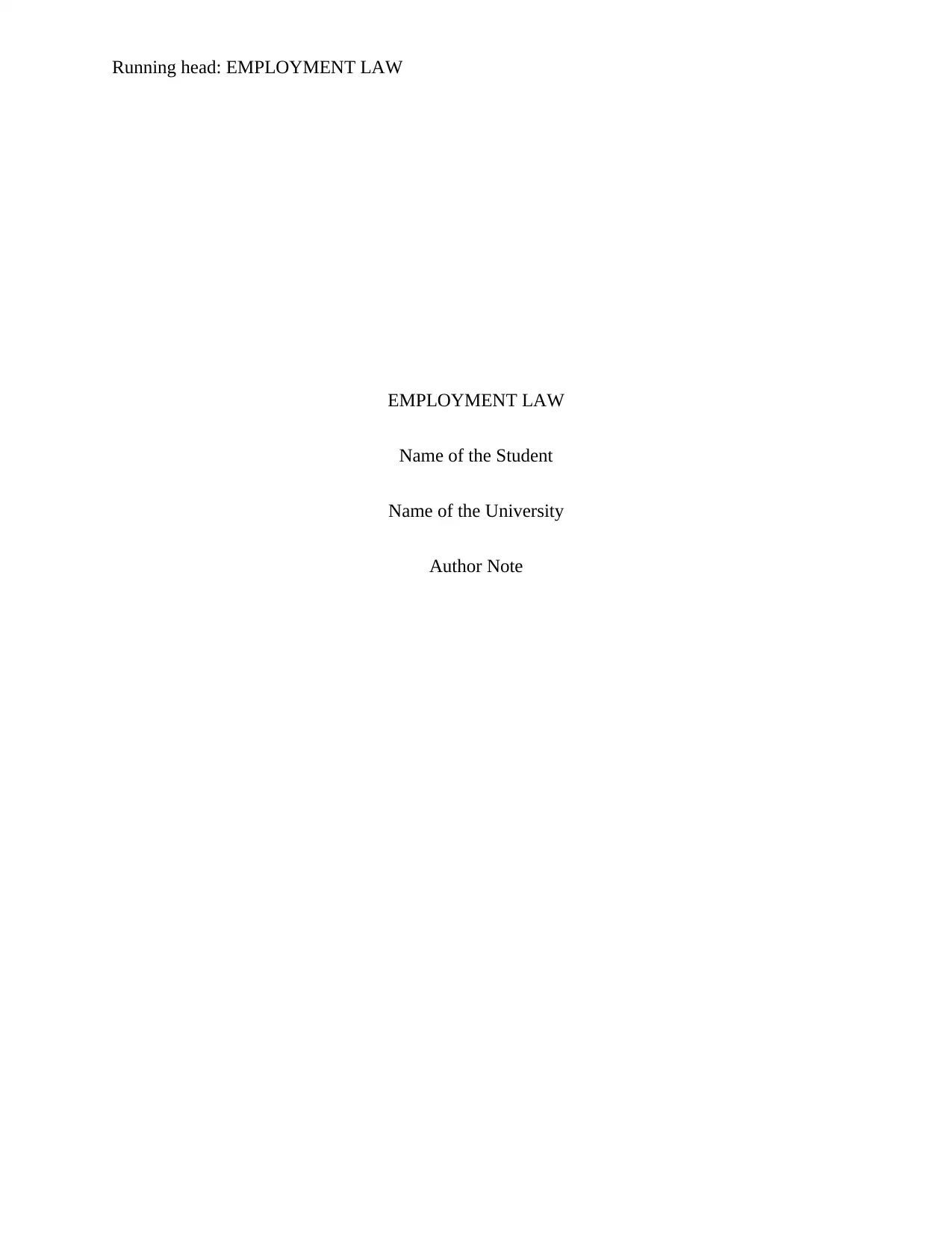
Running head: EMPLOYMENT LAW
EMPLOYMENT LAW
Name of the Student
Name of the University
Author Note
EMPLOYMENT LAW
Name of the Student
Name of the University
Author Note
Paraphrase This Document
Need a fresh take? Get an instant paraphrase of this document with our AI Paraphraser
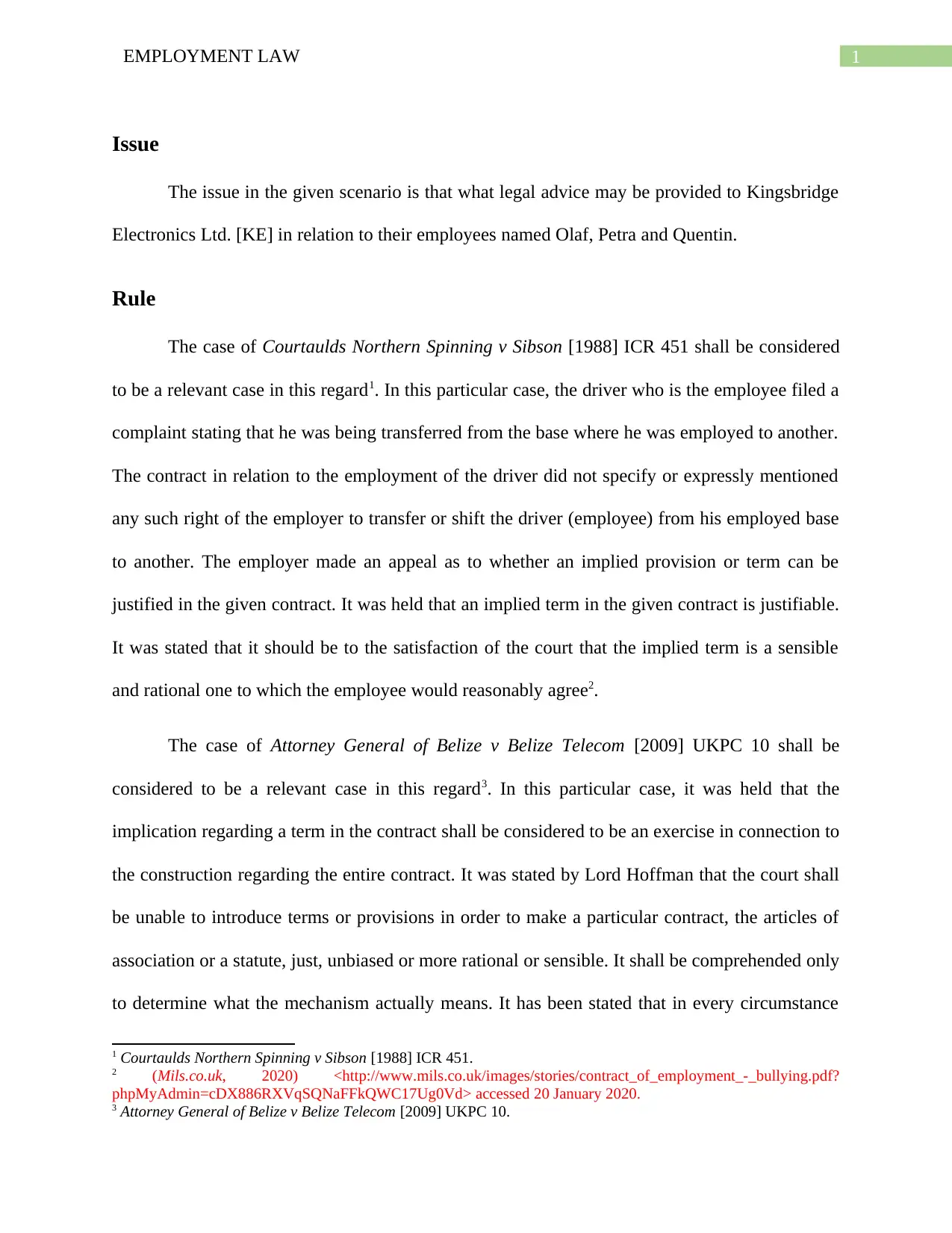
1EMPLOYMENT LAW
Issue
The issue in the given scenario is that what legal advice may be provided to Kingsbridge
Electronics Ltd. [KE] in relation to their employees named Olaf, Petra and Quentin.
Rule
The case of Courtaulds Northern Spinning v Sibson [1988] ICR 451 shall be considered
to be a relevant case in this regard1. In this particular case, the driver who is the employee filed a
complaint stating that he was being transferred from the base where he was employed to another.
The contract in relation to the employment of the driver did not specify or expressly mentioned
any such right of the employer to transfer or shift the driver (employee) from his employed base
to another. The employer made an appeal as to whether an implied provision or term can be
justified in the given contract. It was held that an implied term in the given contract is justifiable.
It was stated that it should be to the satisfaction of the court that the implied term is a sensible
and rational one to which the employee would reasonably agree2.
The case of Attorney General of Belize v Belize Telecom [2009] UKPC 10 shall be
considered to be a relevant case in this regard3. In this particular case, it was held that the
implication regarding a term in the contract shall be considered to be an exercise in connection to
the construction regarding the entire contract. It was stated by Lord Hoffman that the court shall
be unable to introduce terms or provisions in order to make a particular contract, the articles of
association or a statute, just, unbiased or more rational or sensible. It shall be comprehended only
to determine what the mechanism actually means. It has been stated that in every circumstance
1 Courtaulds Northern Spinning v Sibson [1988] ICR 451.
2 (Mils.co.uk, 2020) <http://www.mils.co.uk/images/stories/contract_of_employment_-_bullying.pdf?
phpMyAdmin=cDX886RXVqSQNaFFkQWC17Ug0Vd> accessed 20 January 2020.
3 Attorney General of Belize v Belize Telecom [2009] UKPC 10.
Issue
The issue in the given scenario is that what legal advice may be provided to Kingsbridge
Electronics Ltd. [KE] in relation to their employees named Olaf, Petra and Quentin.
Rule
The case of Courtaulds Northern Spinning v Sibson [1988] ICR 451 shall be considered
to be a relevant case in this regard1. In this particular case, the driver who is the employee filed a
complaint stating that he was being transferred from the base where he was employed to another.
The contract in relation to the employment of the driver did not specify or expressly mentioned
any such right of the employer to transfer or shift the driver (employee) from his employed base
to another. The employer made an appeal as to whether an implied provision or term can be
justified in the given contract. It was held that an implied term in the given contract is justifiable.
It was stated that it should be to the satisfaction of the court that the implied term is a sensible
and rational one to which the employee would reasonably agree2.
The case of Attorney General of Belize v Belize Telecom [2009] UKPC 10 shall be
considered to be a relevant case in this regard3. In this particular case, it was held that the
implication regarding a term in the contract shall be considered to be an exercise in connection to
the construction regarding the entire contract. It was stated by Lord Hoffman that the court shall
be unable to introduce terms or provisions in order to make a particular contract, the articles of
association or a statute, just, unbiased or more rational or sensible. It shall be comprehended only
to determine what the mechanism actually means. It has been stated that in every circumstance
1 Courtaulds Northern Spinning v Sibson [1988] ICR 451.
2 (Mils.co.uk, 2020) <http://www.mils.co.uk/images/stories/contract_of_employment_-_bullying.pdf?
phpMyAdmin=cDX886RXVqSQNaFFkQWC17Ug0Vd> accessed 20 January 2020.
3 Attorney General of Belize v Belize Telecom [2009] UKPC 10.
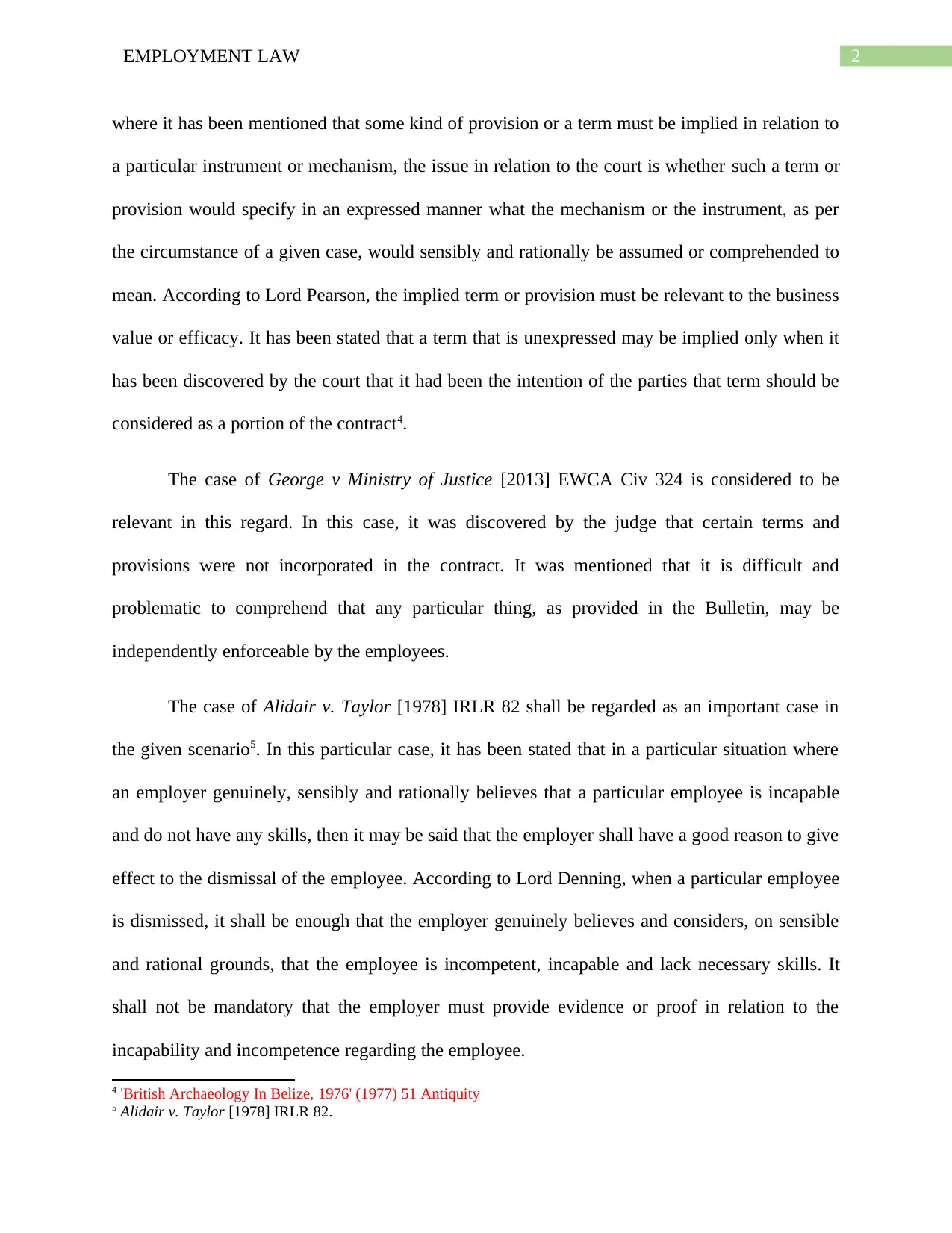
2EMPLOYMENT LAW
where it has been mentioned that some kind of provision or a term must be implied in relation to
a particular instrument or mechanism, the issue in relation to the court is whether such a term or
provision would specify in an expressed manner what the mechanism or the instrument, as per
the circumstance of a given case, would sensibly and rationally be assumed or comprehended to
mean. According to Lord Pearson, the implied term or provision must be relevant to the business
value or efficacy. It has been stated that a term that is unexpressed may be implied only when it
has been discovered by the court that it had been the intention of the parties that term should be
considered as a portion of the contract4.
The case of George v Ministry of Justice [2013] EWCA Civ 324 is considered to be
relevant in this regard. In this case, it was discovered by the judge that certain terms and
provisions were not incorporated in the contract. It was mentioned that it is difficult and
problematic to comprehend that any particular thing, as provided in the Bulletin, may be
independently enforceable by the employees.
The case of Alidair v. Taylor [1978] IRLR 82 shall be regarded as an important case in
the given scenario5. In this particular case, it has been stated that in a particular situation where
an employer genuinely, sensibly and rationally believes that a particular employee is incapable
and do not have any skills, then it may be said that the employer shall have a good reason to give
effect to the dismissal of the employee. According to Lord Denning, when a particular employee
is dismissed, it shall be enough that the employer genuinely believes and considers, on sensible
and rational grounds, that the employee is incompetent, incapable and lack necessary skills. It
shall not be mandatory that the employer must provide evidence or proof in relation to the
incapability and incompetence regarding the employee.
4 'British Archaeology In Belize, 1976' (1977) 51 Antiquity
5 Alidair v. Taylor [1978] IRLR 82.
where it has been mentioned that some kind of provision or a term must be implied in relation to
a particular instrument or mechanism, the issue in relation to the court is whether such a term or
provision would specify in an expressed manner what the mechanism or the instrument, as per
the circumstance of a given case, would sensibly and rationally be assumed or comprehended to
mean. According to Lord Pearson, the implied term or provision must be relevant to the business
value or efficacy. It has been stated that a term that is unexpressed may be implied only when it
has been discovered by the court that it had been the intention of the parties that term should be
considered as a portion of the contract4.
The case of George v Ministry of Justice [2013] EWCA Civ 324 is considered to be
relevant in this regard. In this case, it was discovered by the judge that certain terms and
provisions were not incorporated in the contract. It was mentioned that it is difficult and
problematic to comprehend that any particular thing, as provided in the Bulletin, may be
independently enforceable by the employees.
The case of Alidair v. Taylor [1978] IRLR 82 shall be regarded as an important case in
the given scenario5. In this particular case, it has been stated that in a particular situation where
an employer genuinely, sensibly and rationally believes that a particular employee is incapable
and do not have any skills, then it may be said that the employer shall have a good reason to give
effect to the dismissal of the employee. According to Lord Denning, when a particular employee
is dismissed, it shall be enough that the employer genuinely believes and considers, on sensible
and rational grounds, that the employee is incompetent, incapable and lack necessary skills. It
shall not be mandatory that the employer must provide evidence or proof in relation to the
incapability and incompetence regarding the employee.
4 'British Archaeology In Belize, 1976' (1977) 51 Antiquity
5 Alidair v. Taylor [1978] IRLR 82.
⊘ This is a preview!⊘
Do you want full access?
Subscribe today to unlock all pages.

Trusted by 1+ million students worldwide
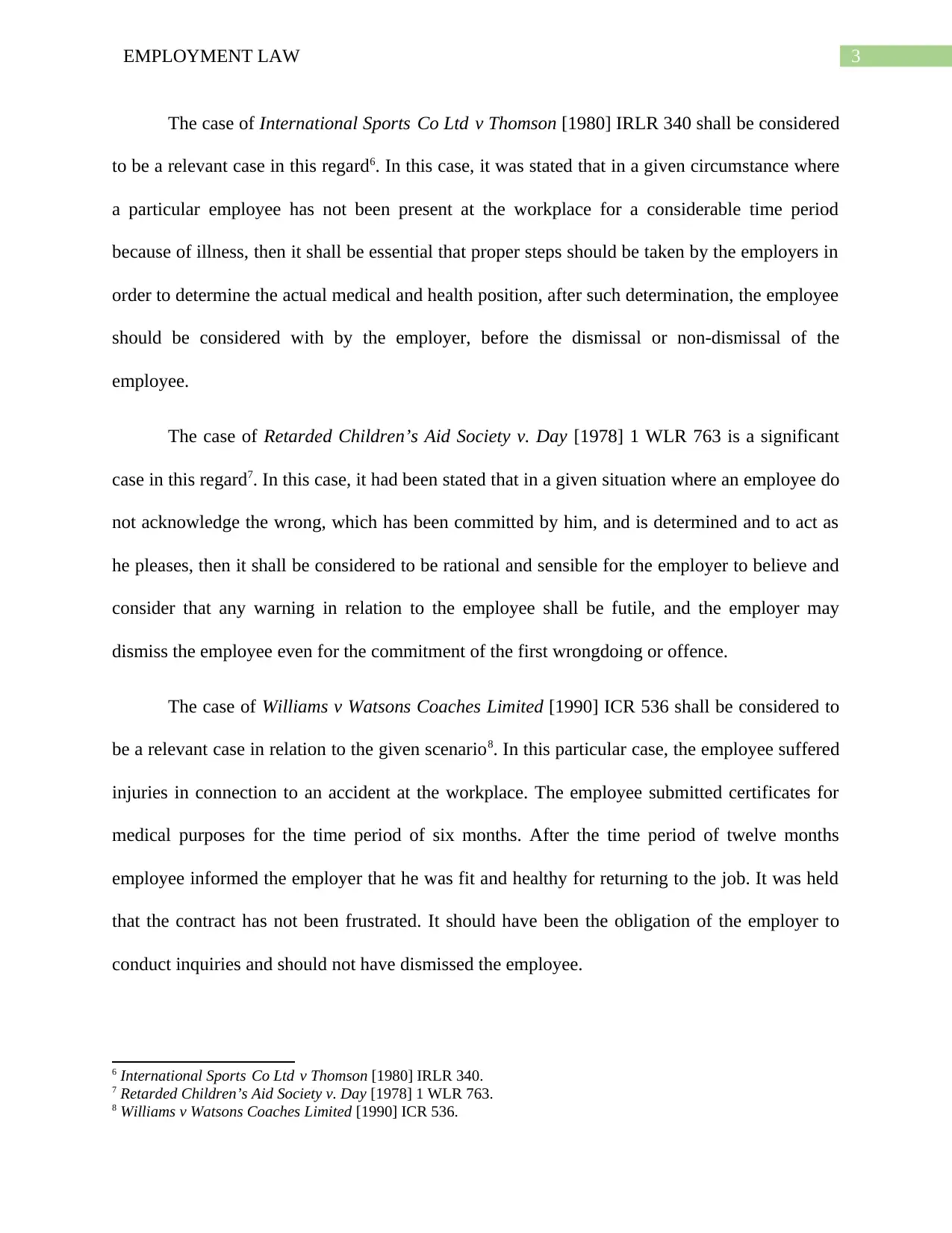
3EMPLOYMENT LAW
The case of International Sports Co Ltd v Thomson [1980] IRLR 340 shall be considered
to be a relevant case in this regard6. In this case, it was stated that in a given circumstance where
a particular employee has not been present at the workplace for a considerable time period
because of illness, then it shall be essential that proper steps should be taken by the employers in
order to determine the actual medical and health position, after such determination, the employee
should be considered with by the employer, before the dismissal or non-dismissal of the
employee.
The case of Retarded Children’s Aid Society v. Day [1978] 1 WLR 763 is a significant
case in this regard7. In this case, it had been stated that in a given situation where an employee do
not acknowledge the wrong, which has been committed by him, and is determined and to act as
he pleases, then it shall be considered to be rational and sensible for the employer to believe and
consider that any warning in relation to the employee shall be futile, and the employer may
dismiss the employee even for the commitment of the first wrongdoing or offence.
The case of Williams v Watsons Coaches Limited [1990] ICR 536 shall be considered to
be a relevant case in relation to the given scenario8. In this particular case, the employee suffered
injuries in connection to an accident at the workplace. The employee submitted certificates for
medical purposes for the time period of six months. After the time period of twelve months
employee informed the employer that he was fit and healthy for returning to the job. It was held
that the contract has not been frustrated. It should have been the obligation of the employer to
conduct inquiries and should not have dismissed the employee.
6 International Sports Co Ltd v Thomson [1980] IRLR 340.
7 Retarded Children’s Aid Society v. Day [1978] 1 WLR 763.
8 Williams v Watsons Coaches Limited [1990] ICR 536.
The case of International Sports Co Ltd v Thomson [1980] IRLR 340 shall be considered
to be a relevant case in this regard6. In this case, it was stated that in a given circumstance where
a particular employee has not been present at the workplace for a considerable time period
because of illness, then it shall be essential that proper steps should be taken by the employers in
order to determine the actual medical and health position, after such determination, the employee
should be considered with by the employer, before the dismissal or non-dismissal of the
employee.
The case of Retarded Children’s Aid Society v. Day [1978] 1 WLR 763 is a significant
case in this regard7. In this case, it had been stated that in a given situation where an employee do
not acknowledge the wrong, which has been committed by him, and is determined and to act as
he pleases, then it shall be considered to be rational and sensible for the employer to believe and
consider that any warning in relation to the employee shall be futile, and the employer may
dismiss the employee even for the commitment of the first wrongdoing or offence.
The case of Williams v Watsons Coaches Limited [1990] ICR 536 shall be considered to
be a relevant case in relation to the given scenario8. In this particular case, the employee suffered
injuries in connection to an accident at the workplace. The employee submitted certificates for
medical purposes for the time period of six months. After the time period of twelve months
employee informed the employer that he was fit and healthy for returning to the job. It was held
that the contract has not been frustrated. It should have been the obligation of the employer to
conduct inquiries and should not have dismissed the employee.
6 International Sports Co Ltd v Thomson [1980] IRLR 340.
7 Retarded Children’s Aid Society v. Day [1978] 1 WLR 763.
8 Williams v Watsons Coaches Limited [1990] ICR 536.
Paraphrase This Document
Need a fresh take? Get an instant paraphrase of this document with our AI Paraphraser
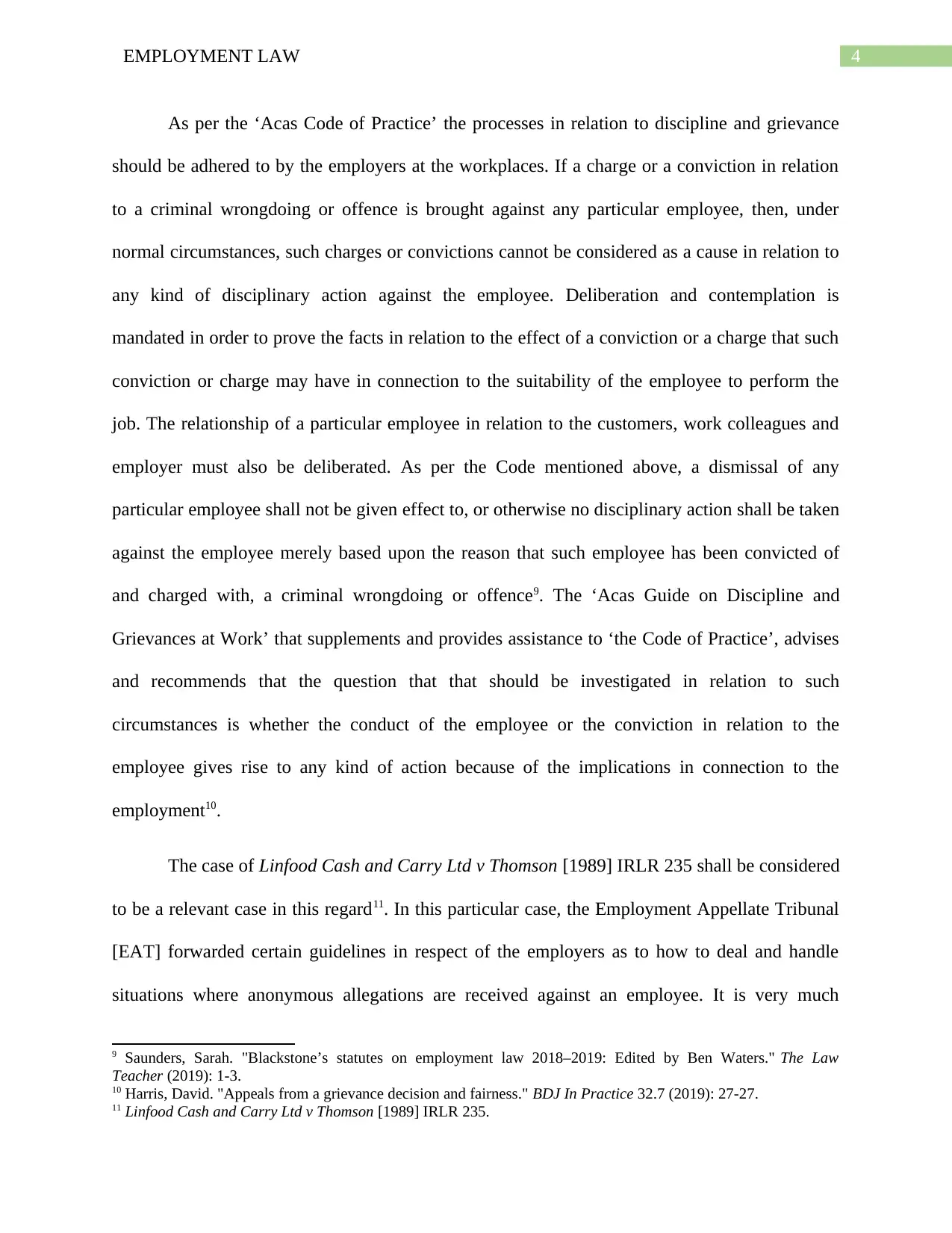
4EMPLOYMENT LAW
As per the ‘Acas Code of Practice’ the processes in relation to discipline and grievance
should be adhered to by the employers at the workplaces. If a charge or a conviction in relation
to a criminal wrongdoing or offence is brought against any particular employee, then, under
normal circumstances, such charges or convictions cannot be considered as a cause in relation to
any kind of disciplinary action against the employee. Deliberation and contemplation is
mandated in order to prove the facts in relation to the effect of a conviction or a charge that such
conviction or charge may have in connection to the suitability of the employee to perform the
job. The relationship of a particular employee in relation to the customers, work colleagues and
employer must also be deliberated. As per the Code mentioned above, a dismissal of any
particular employee shall not be given effect to, or otherwise no disciplinary action shall be taken
against the employee merely based upon the reason that such employee has been convicted of
and charged with, a criminal wrongdoing or offence9. The ‘Acas Guide on Discipline and
Grievances at Work’ that supplements and provides assistance to ‘the Code of Practice’, advises
and recommends that the question that that should be investigated in relation to such
circumstances is whether the conduct of the employee or the conviction in relation to the
employee gives rise to any kind of action because of the implications in connection to the
employment10.
The case of Linfood Cash and Carry Ltd v Thomson [1989] IRLR 235 shall be considered
to be a relevant case in this regard11. In this particular case, the Employment Appellate Tribunal
[EAT] forwarded certain guidelines in respect of the employers as to how to deal and handle
situations where anonymous allegations are received against an employee. It is very much
9 Saunders, Sarah. "Blackstone’s statutes on employment law 2018–2019: Edited by Ben Waters." The Law
Teacher (2019): 1-3.
10 Harris, David. "Appeals from a grievance decision and fairness." BDJ In Practice 32.7 (2019): 27-27.
11 Linfood Cash and Carry Ltd v Thomson [1989] IRLR 235.
As per the ‘Acas Code of Practice’ the processes in relation to discipline and grievance
should be adhered to by the employers at the workplaces. If a charge or a conviction in relation
to a criminal wrongdoing or offence is brought against any particular employee, then, under
normal circumstances, such charges or convictions cannot be considered as a cause in relation to
any kind of disciplinary action against the employee. Deliberation and contemplation is
mandated in order to prove the facts in relation to the effect of a conviction or a charge that such
conviction or charge may have in connection to the suitability of the employee to perform the
job. The relationship of a particular employee in relation to the customers, work colleagues and
employer must also be deliberated. As per the Code mentioned above, a dismissal of any
particular employee shall not be given effect to, or otherwise no disciplinary action shall be taken
against the employee merely based upon the reason that such employee has been convicted of
and charged with, a criminal wrongdoing or offence9. The ‘Acas Guide on Discipline and
Grievances at Work’ that supplements and provides assistance to ‘the Code of Practice’, advises
and recommends that the question that that should be investigated in relation to such
circumstances is whether the conduct of the employee or the conviction in relation to the
employee gives rise to any kind of action because of the implications in connection to the
employment10.
The case of Linfood Cash and Carry Ltd v Thomson [1989] IRLR 235 shall be considered
to be a relevant case in this regard11. In this particular case, the Employment Appellate Tribunal
[EAT] forwarded certain guidelines in respect of the employers as to how to deal and handle
situations where anonymous allegations are received against an employee. It is very much
9 Saunders, Sarah. "Blackstone’s statutes on employment law 2018–2019: Edited by Ben Waters." The Law
Teacher (2019): 1-3.
10 Harris, David. "Appeals from a grievance decision and fairness." BDJ In Practice 32.7 (2019): 27-27.
11 Linfood Cash and Carry Ltd v Thomson [1989] IRLR 235.
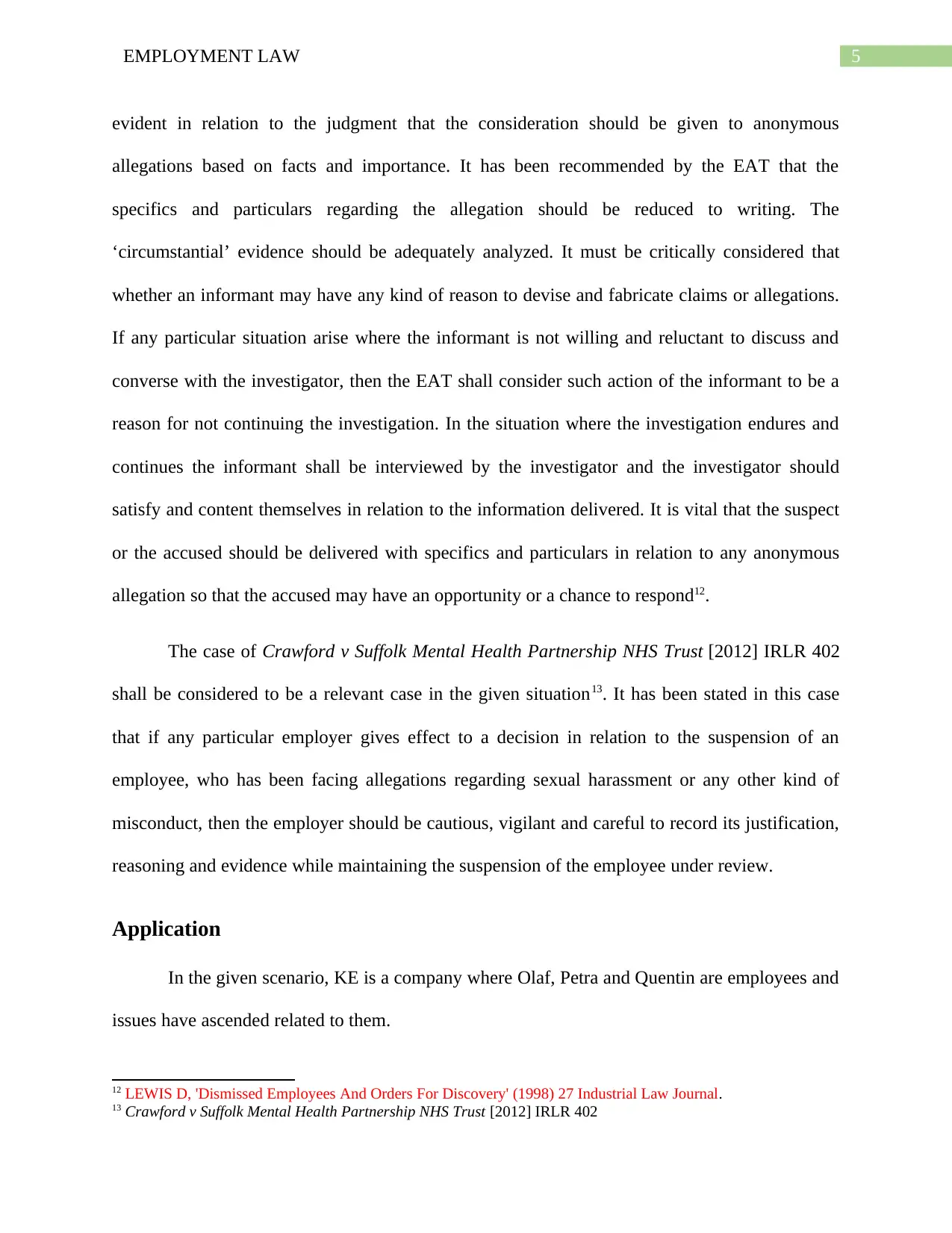
5EMPLOYMENT LAW
evident in relation to the judgment that the consideration should be given to anonymous
allegations based on facts and importance. It has been recommended by the EAT that the
specifics and particulars regarding the allegation should be reduced to writing. The
‘circumstantial’ evidence should be adequately analyzed. It must be critically considered that
whether an informant may have any kind of reason to devise and fabricate claims or allegations.
If any particular situation arise where the informant is not willing and reluctant to discuss and
converse with the investigator, then the EAT shall consider such action of the informant to be a
reason for not continuing the investigation. In the situation where the investigation endures and
continues the informant shall be interviewed by the investigator and the investigator should
satisfy and content themselves in relation to the information delivered. It is vital that the suspect
or the accused should be delivered with specifics and particulars in relation to any anonymous
allegation so that the accused may have an opportunity or a chance to respond12.
The case of Crawford v Suffolk Mental Health Partnership NHS Trust [2012] IRLR 402
shall be considered to be a relevant case in the given situation13. It has been stated in this case
that if any particular employer gives effect to a decision in relation to the suspension of an
employee, who has been facing allegations regarding sexual harassment or any other kind of
misconduct, then the employer should be cautious, vigilant and careful to record its justification,
reasoning and evidence while maintaining the suspension of the employee under review.
Application
In the given scenario, KE is a company where Olaf, Petra and Quentin are employees and
issues have ascended related to them.
12 LEWIS D, 'Dismissed Employees And Orders For Discovery' (1998) 27 Industrial Law Journal.
13 Crawford v Suffolk Mental Health Partnership NHS Trust [2012] IRLR 402
evident in relation to the judgment that the consideration should be given to anonymous
allegations based on facts and importance. It has been recommended by the EAT that the
specifics and particulars regarding the allegation should be reduced to writing. The
‘circumstantial’ evidence should be adequately analyzed. It must be critically considered that
whether an informant may have any kind of reason to devise and fabricate claims or allegations.
If any particular situation arise where the informant is not willing and reluctant to discuss and
converse with the investigator, then the EAT shall consider such action of the informant to be a
reason for not continuing the investigation. In the situation where the investigation endures and
continues the informant shall be interviewed by the investigator and the investigator should
satisfy and content themselves in relation to the information delivered. It is vital that the suspect
or the accused should be delivered with specifics and particulars in relation to any anonymous
allegation so that the accused may have an opportunity or a chance to respond12.
The case of Crawford v Suffolk Mental Health Partnership NHS Trust [2012] IRLR 402
shall be considered to be a relevant case in the given situation13. It has been stated in this case
that if any particular employer gives effect to a decision in relation to the suspension of an
employee, who has been facing allegations regarding sexual harassment or any other kind of
misconduct, then the employer should be cautious, vigilant and careful to record its justification,
reasoning and evidence while maintaining the suspension of the employee under review.
Application
In the given scenario, KE is a company where Olaf, Petra and Quentin are employees and
issues have ascended related to them.
12 LEWIS D, 'Dismissed Employees And Orders For Discovery' (1998) 27 Industrial Law Journal.
13 Crawford v Suffolk Mental Health Partnership NHS Trust [2012] IRLR 402
⊘ This is a preview!⊘
Do you want full access?
Subscribe today to unlock all pages.

Trusted by 1+ million students worldwide
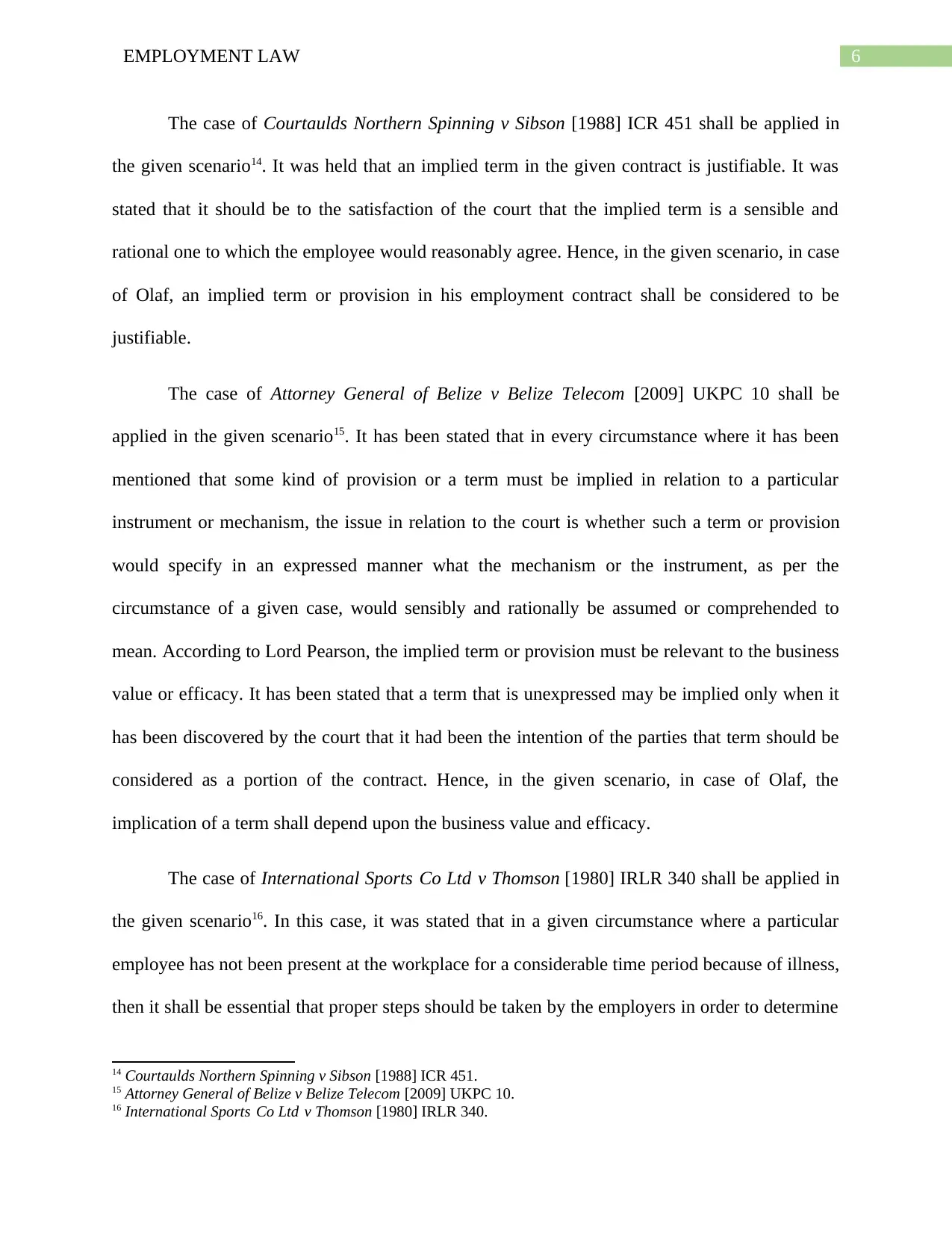
6EMPLOYMENT LAW
The case of Courtaulds Northern Spinning v Sibson [1988] ICR 451 shall be applied in
the given scenario14. It was held that an implied term in the given contract is justifiable. It was
stated that it should be to the satisfaction of the court that the implied term is a sensible and
rational one to which the employee would reasonably agree. Hence, in the given scenario, in case
of Olaf, an implied term or provision in his employment contract shall be considered to be
justifiable.
The case of Attorney General of Belize v Belize Telecom [2009] UKPC 10 shall be
applied in the given scenario15. It has been stated that in every circumstance where it has been
mentioned that some kind of provision or a term must be implied in relation to a particular
instrument or mechanism, the issue in relation to the court is whether such a term or provision
would specify in an expressed manner what the mechanism or the instrument, as per the
circumstance of a given case, would sensibly and rationally be assumed or comprehended to
mean. According to Lord Pearson, the implied term or provision must be relevant to the business
value or efficacy. It has been stated that a term that is unexpressed may be implied only when it
has been discovered by the court that it had been the intention of the parties that term should be
considered as a portion of the contract. Hence, in the given scenario, in case of Olaf, the
implication of a term shall depend upon the business value and efficacy.
The case of International Sports Co Ltd v Thomson [1980] IRLR 340 shall be applied in
the given scenario16. In this case, it was stated that in a given circumstance where a particular
employee has not been present at the workplace for a considerable time period because of illness,
then it shall be essential that proper steps should be taken by the employers in order to determine
14 Courtaulds Northern Spinning v Sibson [1988] ICR 451.
15 Attorney General of Belize v Belize Telecom [2009] UKPC 10.
16 International Sports Co Ltd v Thomson [1980] IRLR 340.
The case of Courtaulds Northern Spinning v Sibson [1988] ICR 451 shall be applied in
the given scenario14. It was held that an implied term in the given contract is justifiable. It was
stated that it should be to the satisfaction of the court that the implied term is a sensible and
rational one to which the employee would reasonably agree. Hence, in the given scenario, in case
of Olaf, an implied term or provision in his employment contract shall be considered to be
justifiable.
The case of Attorney General of Belize v Belize Telecom [2009] UKPC 10 shall be
applied in the given scenario15. It has been stated that in every circumstance where it has been
mentioned that some kind of provision or a term must be implied in relation to a particular
instrument or mechanism, the issue in relation to the court is whether such a term or provision
would specify in an expressed manner what the mechanism or the instrument, as per the
circumstance of a given case, would sensibly and rationally be assumed or comprehended to
mean. According to Lord Pearson, the implied term or provision must be relevant to the business
value or efficacy. It has been stated that a term that is unexpressed may be implied only when it
has been discovered by the court that it had been the intention of the parties that term should be
considered as a portion of the contract. Hence, in the given scenario, in case of Olaf, the
implication of a term shall depend upon the business value and efficacy.
The case of International Sports Co Ltd v Thomson [1980] IRLR 340 shall be applied in
the given scenario16. In this case, it was stated that in a given circumstance where a particular
employee has not been present at the workplace for a considerable time period because of illness,
then it shall be essential that proper steps should be taken by the employers in order to determine
14 Courtaulds Northern Spinning v Sibson [1988] ICR 451.
15 Attorney General of Belize v Belize Telecom [2009] UKPC 10.
16 International Sports Co Ltd v Thomson [1980] IRLR 340.
Paraphrase This Document
Need a fresh take? Get an instant paraphrase of this document with our AI Paraphraser
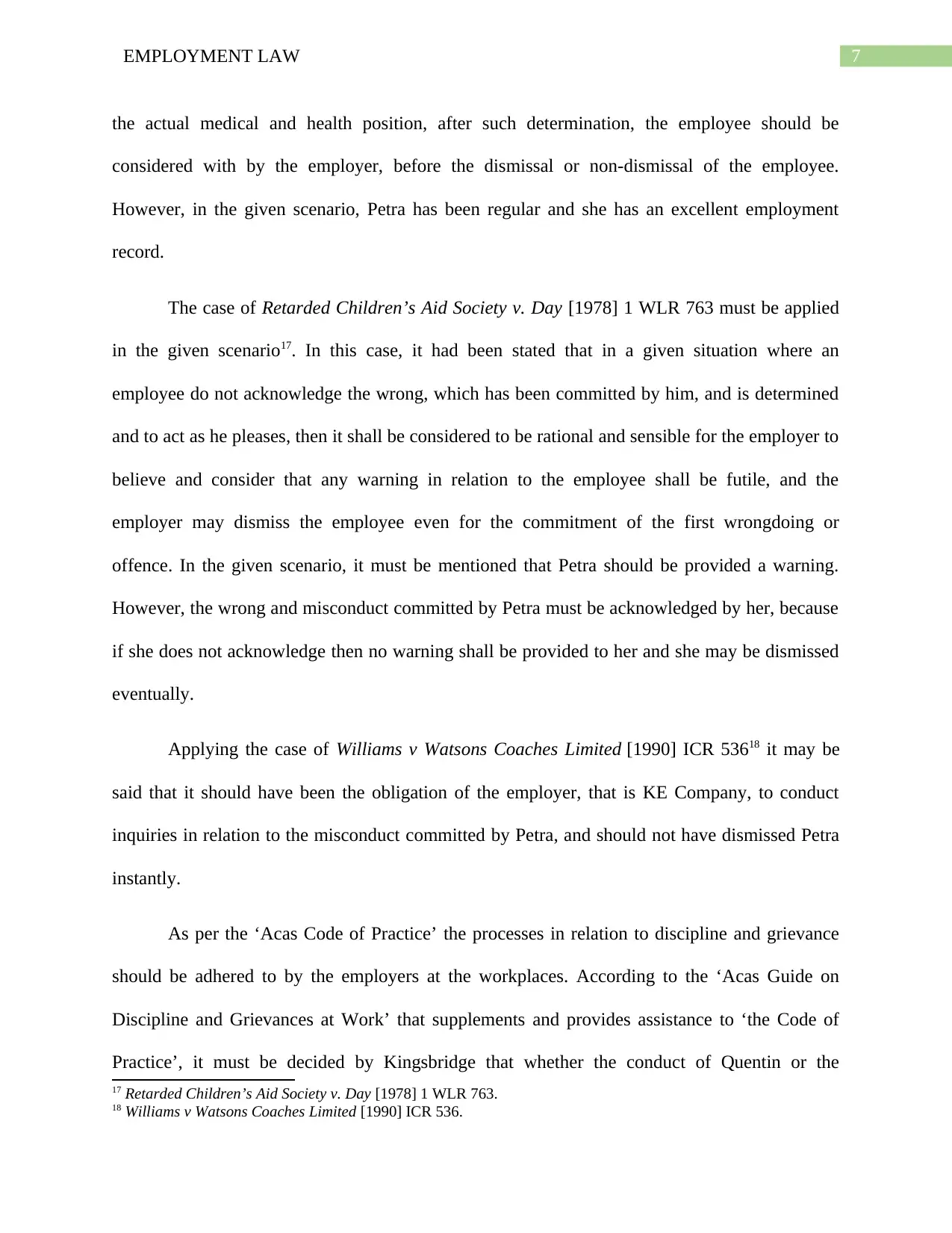
7EMPLOYMENT LAW
the actual medical and health position, after such determination, the employee should be
considered with by the employer, before the dismissal or non-dismissal of the employee.
However, in the given scenario, Petra has been regular and she has an excellent employment
record.
The case of Retarded Children’s Aid Society v. Day [1978] 1 WLR 763 must be applied
in the given scenario17. In this case, it had been stated that in a given situation where an
employee do not acknowledge the wrong, which has been committed by him, and is determined
and to act as he pleases, then it shall be considered to be rational and sensible for the employer to
believe and consider that any warning in relation to the employee shall be futile, and the
employer may dismiss the employee even for the commitment of the first wrongdoing or
offence. In the given scenario, it must be mentioned that Petra should be provided a warning.
However, the wrong and misconduct committed by Petra must be acknowledged by her, because
if she does not acknowledge then no warning shall be provided to her and she may be dismissed
eventually.
Applying the case of Williams v Watsons Coaches Limited [1990] ICR 53618 it may be
said that it should have been the obligation of the employer, that is KE Company, to conduct
inquiries in relation to the misconduct committed by Petra, and should not have dismissed Petra
instantly.
As per the ‘Acas Code of Practice’ the processes in relation to discipline and grievance
should be adhered to by the employers at the workplaces. According to the ‘Acas Guide on
Discipline and Grievances at Work’ that supplements and provides assistance to ‘the Code of
Practice’, it must be decided by Kingsbridge that whether the conduct of Quentin or the
17 Retarded Children’s Aid Society v. Day [1978] 1 WLR 763.
18 Williams v Watsons Coaches Limited [1990] ICR 536.
the actual medical and health position, after such determination, the employee should be
considered with by the employer, before the dismissal or non-dismissal of the employee.
However, in the given scenario, Petra has been regular and she has an excellent employment
record.
The case of Retarded Children’s Aid Society v. Day [1978] 1 WLR 763 must be applied
in the given scenario17. In this case, it had been stated that in a given situation where an
employee do not acknowledge the wrong, which has been committed by him, and is determined
and to act as he pleases, then it shall be considered to be rational and sensible for the employer to
believe and consider that any warning in relation to the employee shall be futile, and the
employer may dismiss the employee even for the commitment of the first wrongdoing or
offence. In the given scenario, it must be mentioned that Petra should be provided a warning.
However, the wrong and misconduct committed by Petra must be acknowledged by her, because
if she does not acknowledge then no warning shall be provided to her and she may be dismissed
eventually.
Applying the case of Williams v Watsons Coaches Limited [1990] ICR 53618 it may be
said that it should have been the obligation of the employer, that is KE Company, to conduct
inquiries in relation to the misconduct committed by Petra, and should not have dismissed Petra
instantly.
As per the ‘Acas Code of Practice’ the processes in relation to discipline and grievance
should be adhered to by the employers at the workplaces. According to the ‘Acas Guide on
Discipline and Grievances at Work’ that supplements and provides assistance to ‘the Code of
Practice’, it must be decided by Kingsbridge that whether the conduct of Quentin or the
17 Retarded Children’s Aid Society v. Day [1978] 1 WLR 763.
18 Williams v Watsons Coaches Limited [1990] ICR 536.
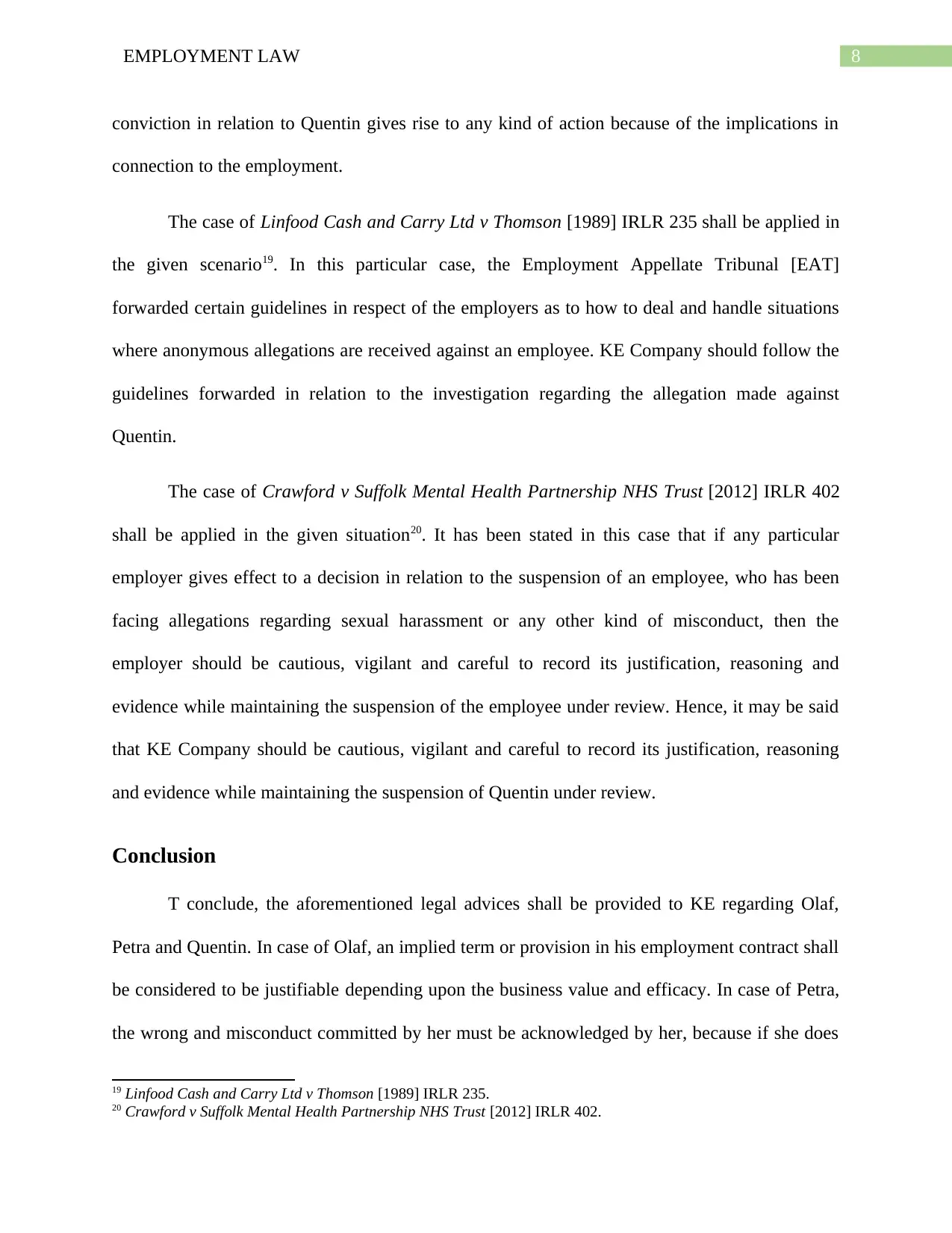
8EMPLOYMENT LAW
conviction in relation to Quentin gives rise to any kind of action because of the implications in
connection to the employment.
The case of Linfood Cash and Carry Ltd v Thomson [1989] IRLR 235 shall be applied in
the given scenario19. In this particular case, the Employment Appellate Tribunal [EAT]
forwarded certain guidelines in respect of the employers as to how to deal and handle situations
where anonymous allegations are received against an employee. KE Company should follow the
guidelines forwarded in relation to the investigation regarding the allegation made against
Quentin.
The case of Crawford v Suffolk Mental Health Partnership NHS Trust [2012] IRLR 402
shall be applied in the given situation20. It has been stated in this case that if any particular
employer gives effect to a decision in relation to the suspension of an employee, who has been
facing allegations regarding sexual harassment or any other kind of misconduct, then the
employer should be cautious, vigilant and careful to record its justification, reasoning and
evidence while maintaining the suspension of the employee under review. Hence, it may be said
that KE Company should be cautious, vigilant and careful to record its justification, reasoning
and evidence while maintaining the suspension of Quentin under review.
Conclusion
T conclude, the aforementioned legal advices shall be provided to KE regarding Olaf,
Petra and Quentin. In case of Olaf, an implied term or provision in his employment contract shall
be considered to be justifiable depending upon the business value and efficacy. In case of Petra,
the wrong and misconduct committed by her must be acknowledged by her, because if she does
19 Linfood Cash and Carry Ltd v Thomson [1989] IRLR 235.
20 Crawford v Suffolk Mental Health Partnership NHS Trust [2012] IRLR 402.
conviction in relation to Quentin gives rise to any kind of action because of the implications in
connection to the employment.
The case of Linfood Cash and Carry Ltd v Thomson [1989] IRLR 235 shall be applied in
the given scenario19. In this particular case, the Employment Appellate Tribunal [EAT]
forwarded certain guidelines in respect of the employers as to how to deal and handle situations
where anonymous allegations are received against an employee. KE Company should follow the
guidelines forwarded in relation to the investigation regarding the allegation made against
Quentin.
The case of Crawford v Suffolk Mental Health Partnership NHS Trust [2012] IRLR 402
shall be applied in the given situation20. It has been stated in this case that if any particular
employer gives effect to a decision in relation to the suspension of an employee, who has been
facing allegations regarding sexual harassment or any other kind of misconduct, then the
employer should be cautious, vigilant and careful to record its justification, reasoning and
evidence while maintaining the suspension of the employee under review. Hence, it may be said
that KE Company should be cautious, vigilant and careful to record its justification, reasoning
and evidence while maintaining the suspension of Quentin under review.
Conclusion
T conclude, the aforementioned legal advices shall be provided to KE regarding Olaf,
Petra and Quentin. In case of Olaf, an implied term or provision in his employment contract shall
be considered to be justifiable depending upon the business value and efficacy. In case of Petra,
the wrong and misconduct committed by her must be acknowledged by her, because if she does
19 Linfood Cash and Carry Ltd v Thomson [1989] IRLR 235.
20 Crawford v Suffolk Mental Health Partnership NHS Trust [2012] IRLR 402.
⊘ This is a preview!⊘
Do you want full access?
Subscribe today to unlock all pages.

Trusted by 1+ million students worldwide
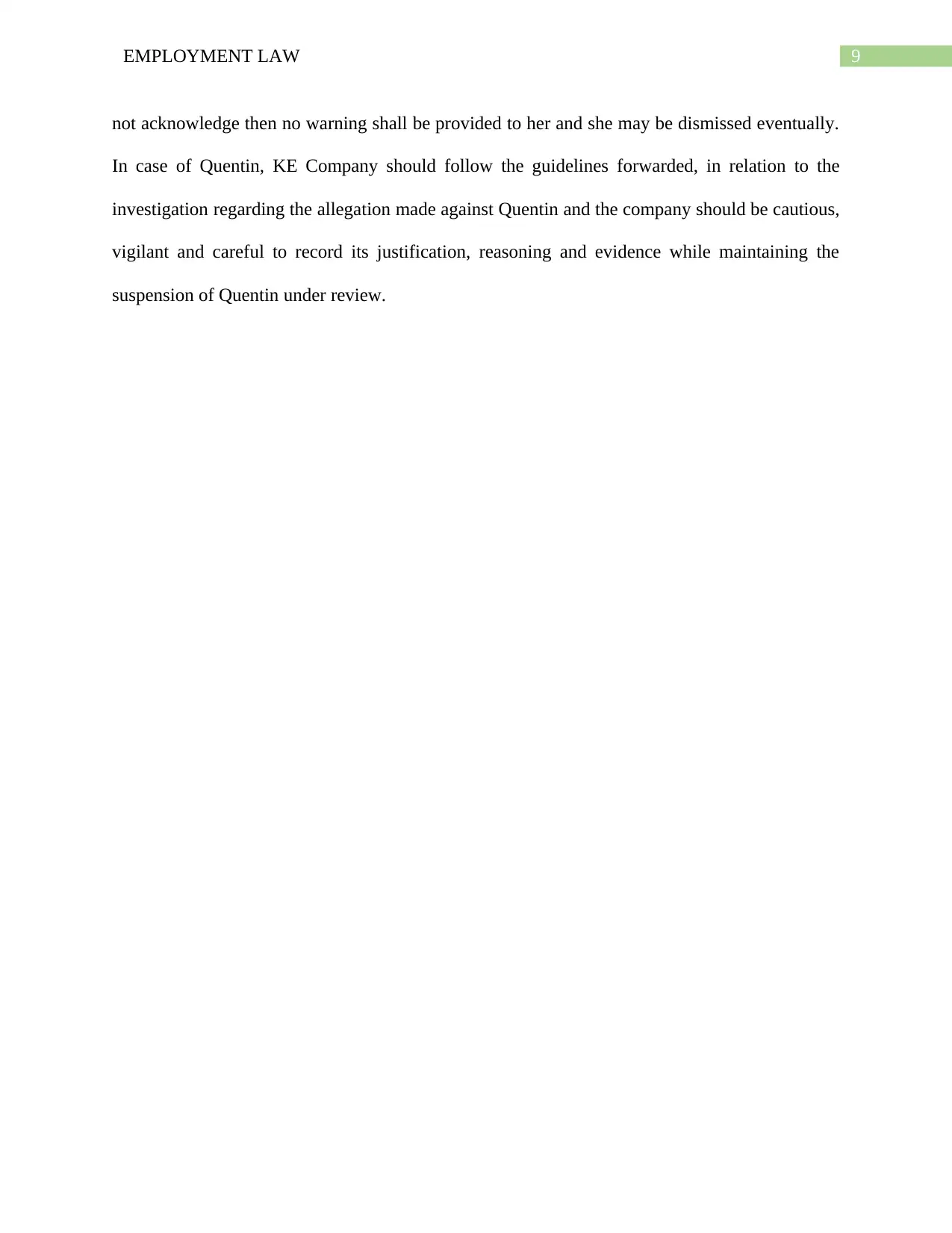
9EMPLOYMENT LAW
not acknowledge then no warning shall be provided to her and she may be dismissed eventually.
In case of Quentin, KE Company should follow the guidelines forwarded, in relation to the
investigation regarding the allegation made against Quentin and the company should be cautious,
vigilant and careful to record its justification, reasoning and evidence while maintaining the
suspension of Quentin under review.
not acknowledge then no warning shall be provided to her and she may be dismissed eventually.
In case of Quentin, KE Company should follow the guidelines forwarded, in relation to the
investigation regarding the allegation made against Quentin and the company should be cautious,
vigilant and careful to record its justification, reasoning and evidence while maintaining the
suspension of Quentin under review.
Paraphrase This Document
Need a fresh take? Get an instant paraphrase of this document with our AI Paraphraser
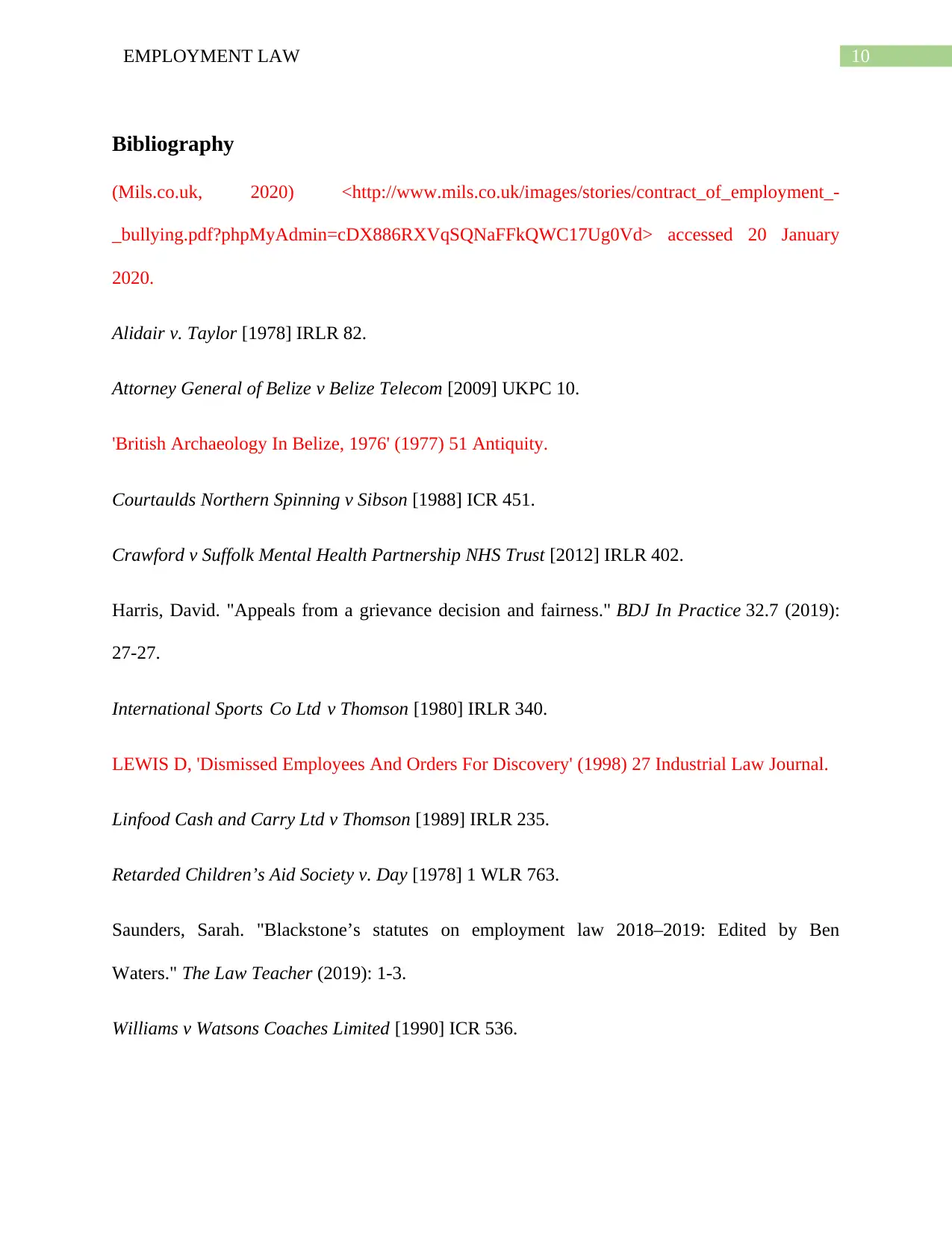
10EMPLOYMENT LAW
Bibliography
(Mils.co.uk, 2020) <http://www.mils.co.uk/images/stories/contract_of_employment_-
_bullying.pdf?phpMyAdmin=cDX886RXVqSQNaFFkQWC17Ug0Vd> accessed 20 January
2020.
Alidair v. Taylor [1978] IRLR 82.
Attorney General of Belize v Belize Telecom [2009] UKPC 10.
'British Archaeology In Belize, 1976' (1977) 51 Antiquity.
Courtaulds Northern Spinning v Sibson [1988] ICR 451.
Crawford v Suffolk Mental Health Partnership NHS Trust [2012] IRLR 402.
Harris, David. "Appeals from a grievance decision and fairness." BDJ In Practice 32.7 (2019):
27-27.
International Sports Co Ltd v Thomson [1980] IRLR 340.
LEWIS D, 'Dismissed Employees And Orders For Discovery' (1998) 27 Industrial Law Journal.
Linfood Cash and Carry Ltd v Thomson [1989] IRLR 235.
Retarded Children’s Aid Society v. Day [1978] 1 WLR 763.
Saunders, Sarah. "Blackstone’s statutes on employment law 2018–2019: Edited by Ben
Waters." The Law Teacher (2019): 1-3.
Williams v Watsons Coaches Limited [1990] ICR 536.
Bibliography
(Mils.co.uk, 2020) <http://www.mils.co.uk/images/stories/contract_of_employment_-
_bullying.pdf?phpMyAdmin=cDX886RXVqSQNaFFkQWC17Ug0Vd> accessed 20 January
2020.
Alidair v. Taylor [1978] IRLR 82.
Attorney General of Belize v Belize Telecom [2009] UKPC 10.
'British Archaeology In Belize, 1976' (1977) 51 Antiquity.
Courtaulds Northern Spinning v Sibson [1988] ICR 451.
Crawford v Suffolk Mental Health Partnership NHS Trust [2012] IRLR 402.
Harris, David. "Appeals from a grievance decision and fairness." BDJ In Practice 32.7 (2019):
27-27.
International Sports Co Ltd v Thomson [1980] IRLR 340.
LEWIS D, 'Dismissed Employees And Orders For Discovery' (1998) 27 Industrial Law Journal.
Linfood Cash and Carry Ltd v Thomson [1989] IRLR 235.
Retarded Children’s Aid Society v. Day [1978] 1 WLR 763.
Saunders, Sarah. "Blackstone’s statutes on employment law 2018–2019: Edited by Ben
Waters." The Law Teacher (2019): 1-3.
Williams v Watsons Coaches Limited [1990] ICR 536.
1 out of 11
Related Documents
Your All-in-One AI-Powered Toolkit for Academic Success.
+13062052269
info@desklib.com
Available 24*7 on WhatsApp / Email
![[object Object]](/_next/static/media/star-bottom.7253800d.svg)
Unlock your academic potential
Copyright © 2020–2026 A2Z Services. All Rights Reserved. Developed and managed by ZUCOL.





